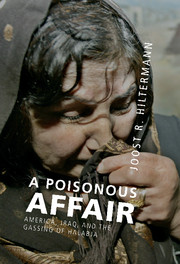"Joost Hiltermann has written an authoritative account of the real use of weapons of mass destruction in the contemporary Middle East-Saddam Hussein's massive use of chemical weapons against Iran in the 1980s. His research documents with great persuasiveness not only Iraqi crimes but also the culpability of those in the international community who carefully looked the other way or tacitly collaborated. "
Gary Sick, former member of the National Security Council staff, Director of the Gulf/2000 Project, Columbia University
"In A Poisonous Affair Joost Hiltermann has crafted a gripping narrative out of some of the most chilling events of the last two decades. But A Poisonous Affair is not simply a rigorous and important piece of history. By revisiting Saddam Hussein's worst massacre and the US response to it, Hilterman masterfully excavates the roots of our current predicament. He shows how the traumatization of the Kurds spawned their mistrust of all things Iraqi, fueling the separatism of the present. He reveals the degree to which America's support for Saddam while he was gassing his own people bred fierce and lasting skepticism about whether Washington could be trusted in the region. And he demonstrates how America's indifference to Saddam's chemical attacks on Iran helped convince Iran to go it alone, and to acquire its own weapons of mass destruction. Hilterman has given us a necessary book about a ghastly crime, the legacy of which we will be managing for decades to come."
Samantha Power, Harvard University, and author of A Problem from Hell": America and the Age of Genocide
"Joost Hiltermann is one of the Iraq observers that journalists and policymakers count on most for historical memory and acute analysis. In A Poisonous Affair he has produced a gracefully written and timely reminder that the combination of weapons of mass destruction, geo-political mendacity, and vast human suffering has a rich history in Iraq. The story of Halabja reveals at once why the regime of Saddam Hussein deserved to fall and why America was a dubious agent of its demise."
George Packer, author of The Assassins' Gate: America in Iraq
Book Description
In March 1988, during the Iran-Iraq war, thousands were killed in a chemical attack on a town in Iraqi Kurdistan. Both sides accused the other. Gradually it emerged that Saddam Hussein, with the tacit support of his western allies, was responsible. This book tells the story of the gassing of Halabja, and how Iraq amassed chemical weapons to target Iranian soldiers and Kurdish villagers as America looked the other way. Today, as the Middle East sinks further into turmoil, these policies are coming back to haunt the West.
 Review from Amazon.com
Review from Amazon.com